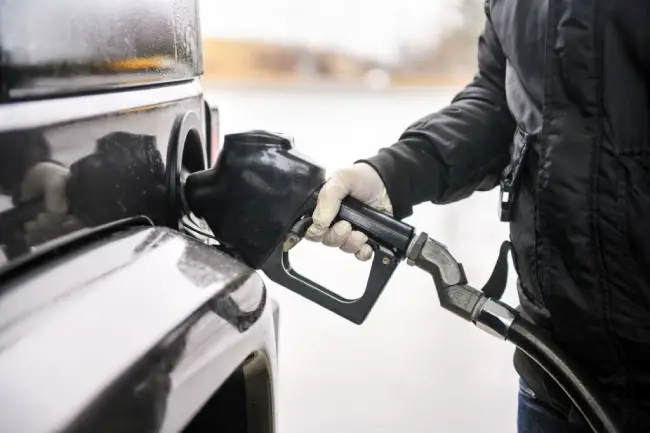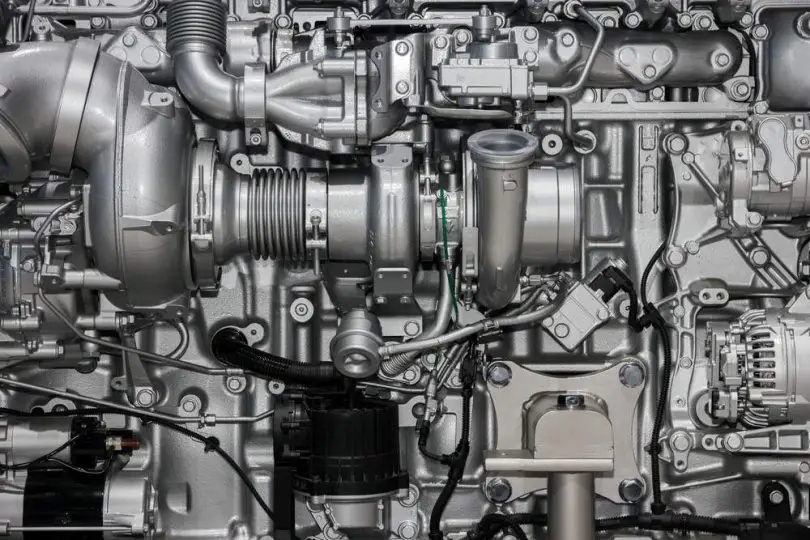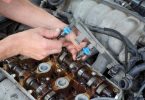Imagine chatting on the phone while pumping gas, then realizing you put unleaded gas in your diesel car. It doesn’t happen too often, but it does happen. Here we look at the effects of gasoline in a diesel engine, how gas a diesel engine can tolerate, and what to do if it happens.
How engines use diesel and gas
Diesel and gas engines both use combustion to turn fuel into mechanical energy.
The air and fuel mix in a gasoline engine, then the pistons compress that mixture so that the spark plugs can ignite the mixture.
Diesel engines don’t have spark plugs, so the pistons compress the fuel and heat the air so the injectors can inject the fuel into the combustion chamber. Then, the engine ignites the fuel used to run the vehicle.
Immediate effects of gasoline in diesel engine
As soon as the gasoline hits the diesel fuel, it lowers the flash point. The flash point is the temperature that the liquid vapors become flammable and can catch fire. This mix creates a high gas concentration in the tank, so the flash point varies throughout the tank. A 1% gas contamination in diesel lowers the flash point by 18 degrees C, causing a premature ignition in a diesel engine and damaging the engine.
The gas dilution affects the engine lubrication causing damage to diesel injectors and fuel pump.
How much gas is too much?
If you were to put 3 gallons of gas in a diesel engine, there wouldn’t be any significant damage because three gallons of gas in a tank of diesel fuel is minimal. But, even three gallons will affect the lubrication of the diesel injectors and high-pressure rail engines.
At five gallons in a diesel engine, it will depend on how much diesel is in the tank when you put the gas in the vehicle. The octane rating on diesel is 25 – 40. You lower the rating by 1 point by adding 2% gasoline into your diesel vehicle. So if you started at 37% octane, after adding 2% gas, you now have an octane rating of 36%.
If you were to add 1% petrol to 10% diesel, you would lower the octane by 5%, which may cause slight damage to the engine.
Once you’ve added more than 10% gas to your diesel engine, you will have significant issues. Once you have 10% gas in your diesel engine, you need to park it without attempting to restart it until you can get to a mechanic.
Signs That There Is Gas in Your Diesel Engine
Engine damage can happen quickly. If you have any of these issues while driving, pull over, turn off the vehicle, and contact a tow truck.
Check engine light
The gas fouls up the spark plugs, which sets off the check engine light as you start the car.
Black Smoke
Diesel ignites at 52 degrees C, but gasoline ignites at -40 degrees C, making it harder for gas to burn in a diesel engine. The unburned fuel will create lots of foul-smelling black smoke. Waiting too long to correct the problem allows the soot to obstruct the fuel system sensors.
Engine overheats
Diesel can’t use gasoline as fuel, so the engine overheats as it runs.
Inadequate lubrication
Gasoline is a solvent often used to clean auto parts. The oil in diesel fuel lubricates the engine and its components. When you contaminate diesel with gasoline, you reduce the lubricating effect of the diesel in the engine. The friction from the metal on metal parts damages the engine’s components.
Damage from shockwave
Gas changes how your diesel engine combusts. This combustion creates shockwaves that can damage parts like the wrist pins, pistons, crankshaft, con rods, camshafts, and pushrods. The result will be an engine knock.
Engine will fail
Gas in a diesel engine causes engine failure and malfunctions. Driving a diesel engine contaminated with gas can ruin the engine.
Damage to the fuel system
It makes sense that putting the wrong fuel in a diesel fuel tank will damage the parts with the most contact with the contaminated fuel. The gasoline will damage the fuel filters, pump, and injectors. You end up replacing your fuel system due to this damage.
Ignition loss
Diesel engines can’t ignite gasoline because gasoline requires a spark to ignite. If somehow there is an ignition, your diesel engine will not operate as it should.
Hesitation
Contaminated diesel will constantly shut down the cylinders, creating a hesitation. While driving at high speeds, the car will stutter or hesitate before accelerating.
What to Do if There Is Diesel Fuel Contamination

There is no quick fix for this! You will need to be proactive and follow the steps below.
Remove your keys – Take the keys out of the ignition. Staring the car could cause engine damage. Leave it off.
Move the car to safety – If you are still at the gas pump, put the car in neutral and move it somewhere safe and out of the way.
Contact a tow service – Call a tow service to get you to a mechanic or repair shop.
Call the mechanic – Call your mechanic to tell him why the car is on its way. Your mechanic can flush out the fuel system.
Wrong gas prevention
Pay attention
Leave the phone in the car and avoid distractions. If you aren’t sure which is diesel at the gas pump, read the choices. Diesel fuel is always on the green-handled pump, and the word diesel will be in a green box on most fuel pumps.
Install a misfuelling device
Some car manufacturers have a fuel prevention device already installed. The device ensures that only a diesel pump nozzle can fit in the tank. If your car doesn’t have one, you can always buy a mis-fueling prevention device and install it yourself. You can purchase a prevention gas cap or an insert for the gas tank that will only allow a diesel nozzle to fit in the gas tank. You can buy these online for $10 to $20 and install them yourself.
Check the manual
Your owner’s manual recommends the type of gas you should use. Some manufacturers even mark the gas cap. Only diesel engines use diesel fuel!
The cost of draining the fuel system
Putting gasoline in the diesel engine contaminates the entire fuel system. Draining the fuel system will cost you between $400 to $1500, depending on what needs replacing after the flush. Cleaning the tank can cost another $30 to $80. Plus, there is the cost of the tow service and the labor for the fuel draining and tank cleaning.
Avoid all these costs by ensuring you use the correct fuel every time you fill up!










Leave a Comment